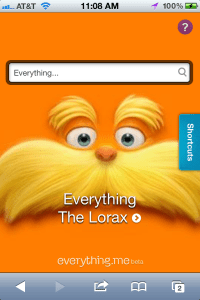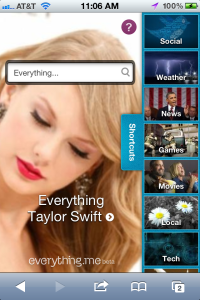One of the biggest challenges we’re facing as we move into the post-PC era is the challenge of navigating through a disconnected web of applications. Bought and sold as self-contained packages of code, apps are independent little creations, boxes you tap for specific functions. Single purpose beings.
Unlike the web, apps are not connected to each other through links (although they could be), nor are they yet accessible through next-generation discovery tools like Apple’s Siri. And today’s companies are so focused on helping push more and more apps on users through app discovery services, they’re forgetting to solve the very real problem of providing a window into the existing ones. How do you Google a database of apps? How do you know which app to launch for the job at hand?
The solution to this problem could look something like this: The Everything Project, an engine that searches not for apps, but in mobile web versions of them.
Most of the app search services we’ve covered previously: (eg. Chomp, Quixey, Xyologic, Appolocious, AppsFire, Kinetik, Crosswa.lk, etc.) are about bringing new native apps to your attention. But there are limits to how many apps you can manage. Not only do our mobile devices have hard limits in terms of storage space available for applications, each of us has our own psychological threshold as well. How many apps’ names can you remember? Can you remember what they all do? Do you really need a native app installed for every website you visit, retail store you frequent, or online service you use?
Perhaps not.
 We faced this challenge once before on the web. Links were once organized in directory structures, with websites categorized and placed into lists. This is very much how mobile application stores function today. (Need a game? Look in “Games.” Need a Twitter app? Check out the “Social” section.) On the web, we soon realized that it was more efficient to search through an index of websites, and the result we needed was not necessarily a particular website, but the information it contained. How does this analogy relate to the mobile universe? Well, if you’re looking for information about a topic, you may want to see tweets, hear a song, watch a video or read a news article, but you may not know which apps contain which information. And what’s more – you may not have the right apps installed to do the job. This is perhaps more true if you’re a new mobile user, still somewhat unaware of the thousands of apps available to you.
We faced this challenge once before on the web. Links were once organized in directory structures, with websites categorized and placed into lists. This is very much how mobile application stores function today. (Need a game? Look in “Games.” Need a Twitter app? Check out the “Social” section.) On the web, we soon realized that it was more efficient to search through an index of websites, and the result we needed was not necessarily a particular website, but the information it contained. How does this analogy relate to the mobile universe? Well, if you’re looking for information about a topic, you may want to see tweets, hear a song, watch a video or read a news article, but you may not know which apps contain which information. And what’s more – you may not have the right apps installed to do the job. This is perhaps more true if you’re a new mobile user, still somewhat unaware of the thousands of apps available to you.
While there may always be those “special” apps you use every day, like email, Facebook, Instagram or Google Maps, for example, many of the other apps we access involve less occasional launches. Do we really need native versions of everything, or will mobile web apps do?
Enter, The Everything Project. (Note: this link only works on mobile devices.)
The new service is really an experiment about what a search engine for mobile web applications would look like. It comes from the creators of DoAt, the TechCrunch Disrupt finalist that was also an app search engine of sorts.
DoAt was an inkling of an idea – an alpha. The Everything Project (company homepage) is the beta. The company is rebranding, leaving DoAt and moving forward with this instead. Explains Co-founder Ami Ben-David, the company learned what users wanted from DoAt, and The Everything Project is the result. It’s a search engine, where results are apps. “You search like a search and you get your answers in apps. And when you’re done, they [the apps] go away,” he says.
It’s pretty amazing, actually, which was the goal. “The intent was to create magic, something that regular people are really astonished by and happy with,” he explains.
So how does this thing work?

For now, The Everything Project is a mobile website. It works on mobile devices, whether iPhones, Androids, Windows Phones or anything else. Later, it will also be built as a native app for all the major platforms.
On the website’s homescreen is a search box and in the background, somewhat Bing-like, there’s an image. The background image slowly fades out and is replaced by another. Each features a link to a search for that topic. For example, Lady Gaga, Anonymous and Rick Perry were among the backgrounds when I first tested. Today, I see The Lorax, Taylor Swift and Tornado news. These are today’s trending topics – the top searches on The Everything Project’s engine. Obviously, these topics change over time, as people’s queries change. The site is also featuring some of its sections (“tech,” “weather,” etc.) as homescreen backgrounds too.
Off to the side are The Everything Project’s search “verticals.” Where Google has Images, News, Videos, Maps and Shopping, The Everything Project has similar ones, like Social, Weather, Food, Movies, Shopping, News, Games and more.
Then there is the main search box. Like any search engine, you enter a query and the box will begin to offer search suggestions for you below as you type, based on others’ searches. You can continue to enter your query or tap one of the provided suggestions to speed things up.
Now, for the results. This is where things get crazy.
 Take, for example, a search for “Mitt Romney.” Unlike on Google, which would return a list of links, The Everything Project returns apps. But not a list of available apps in the app store (i.e, those you could install on your device) or a list of apps you own. It returns a list of HTML5-based web applications you can use right now. And it lists them based on relevancy to your query, something the underlying semantic technology learns as more users search and tap on the app results. It also discovers the mobile version of the politician’s homepage, and lists that, too.
Take, for example, a search for “Mitt Romney.” Unlike on Google, which would return a list of links, The Everything Project returns apps. But not a list of available apps in the app store (i.e, those you could install on your device) or a list of apps you own. It returns a list of HTML5-based web applications you can use right now. And it lists them based on relevancy to your query, something the underlying semantic technology learns as more users search and tap on the app results. It also discovers the mobile version of the politician’s homepage, and lists that, too.
Now, tap on any app. In this example (“Mitt Romney”), maybe you’ll choose CNN, YouTube, Twitter, Yahoo News or MSNBC. Or maybe you’re looking for something a little more offbeat, so you pick Reddit or Fwix or The Onion. The web app launches and the results quickly appear.
Really quickly, actually. The speed, a combination of mobile optimization, caching and some “secret sauce,” was surprising. (Obviously, speed is affected by mobile connectivity. I tested on Wi-Fi.)
In some cases, The Everything Project uses the HTML5 app already available, but just as often, it launches a customized app the startup built itself. There are already hundreds of these custom apps from the thousands you can find through the service. For example, the custom Twitter app offers a specialized interface that shows you people who match your search query as well as tweets that match your query, but all in one window. If you tap on a tweet, however, you’ll be redirected to Twitter’s own HTML5 mobile app.
But sometimes, HTML5 apps alone can’t do it all. In these cases, they’re inter-connected with their native counterparts. For example, if you search for “Coldplay” then launch the Pandora app, you have the option to tap a button that launches the “Coldplay station” (Coldplay radio) in the native app.
A prompt appears allowing you to choose to launch the app you have installed on your phone or download the app from the app store. (This prompt will be eliminated when The Everything Project is a native app – it would then know if the app was installed or not.)
So what comes next? The end of the native app universe? Well, not quite.
“…A native app is always slightly better than an HTML5 app,” says Ben-David, “but once a system like ours exists, suddenly an HTML5 app is searchable, it can be part of an experience where people find it and use it on the fly, and then it becomes much more appealing.”
Any developer will be able to add their own HTML5 apps into The Everything Project’s open app platform when it publicly launches, and these, in turn, could become mechanisms for native app discovery. But launching those native apps could be an on-demand function from within The Everything Project itself, called up as needed. If anything, The Everything Project is an interesting take on what a marriage between the two worlds, native and web, could one day look like.
Is it a real solution for the coming app-ocalypse, which has overloaded our devices with native apps and made app discovery a source of real pain for mobile developers? I can’t say that I would go that far yet. The Everything Project today is still very much a beta, as even its own developers will admit.
But the project is definitely an interesting experiment, and that’s something which the app ecosystem needs more of.
P.S. For those of you attending SXSW, The Everything Project has mobilized all the keywords which people will search for in Austin, including names of venues, words and phrases like “BBQ,” “SXSW Music,” etc., hotels, and more. There’s also a great mobile version of the SXSW schedule which appears when you search for “SXSW” from the homepage.
